Key takeaways:
- Luxury retirement homes enhance residents’ emotional well-being through community engagement and thoughtful design.
- Teamwork in volunteering fosters meaningful connections, highlights individual strengths, and cultivates a sense of purpose.
- Building relationships with residents involves genuine interactions and shared activities, leading to stronger community bonds.
- Collaboration in care enhances daily activities and resident empowerment, resulting in improved individual well-being.

Understanding luxury retirement homes
Luxury retirement homes offer more than just a place to live; they create a vibrant community centered around comfort and engagement. I remember visiting a luxury retirement community and being struck by the beautiful gardens, where residents would gather to socialize and share stories. Isn’t it heartwarming to think about the friendships that blossom in such settings?
The amenities at luxury retirement homes often cater to a variety of interests and lifestyles, from gourmet dining to wellness programs. I once participated in a cooking class with residents, and it was incredible to see their enthusiasm for sharing recipes – a mix of cherished traditions and new culinary adventures. What better way to bond with someone than over the joy of food?
Understanding luxury retirement homes means recognizing that they prioritize not just the physical environment, but also the emotional well-being of their residents. I’ve witnessed firsthand how the thoughtful design of communal spaces encourages interaction, fostering a sense of belonging and purpose. It raises an important question: how much does our environment shape our happiness in later years? The answer is often reflected in the lived experiences of those who call these homes their own.
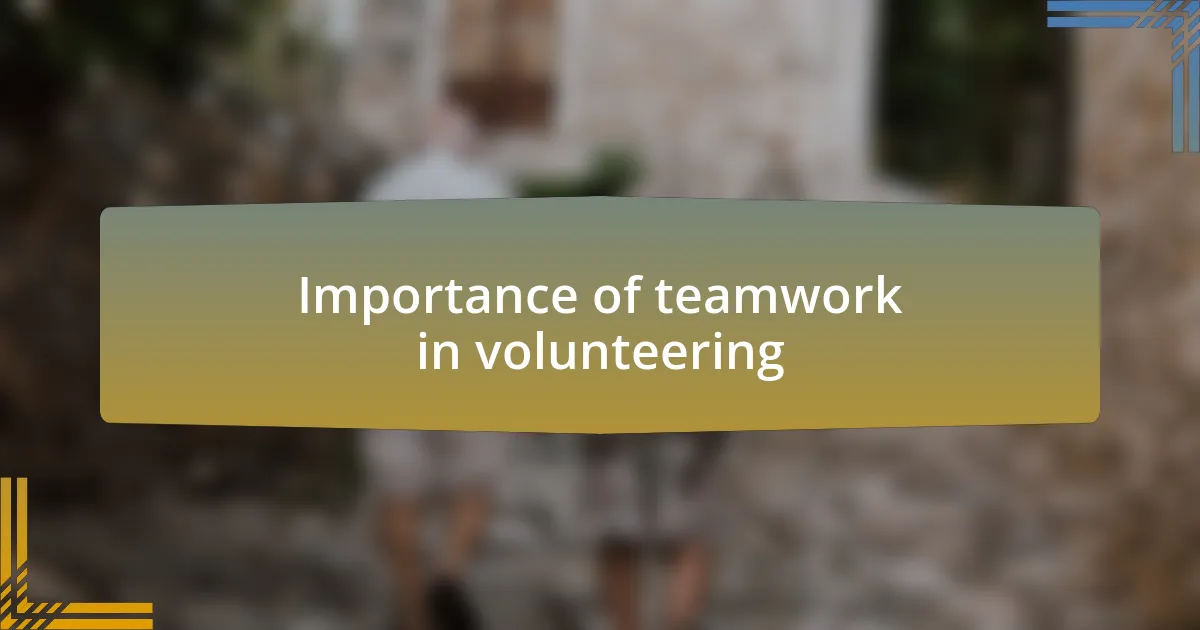
Importance of teamwork in volunteering
Teamwork in volunteering serves as a cornerstone for fostering meaningful connections among participants. I recall a community clean-up event where a mix of ages and backgrounds came together to achieve a common goal. It was inspiring to see how our collective energy turned a daunting task into a fun and rewarding experience—working side by side truly highlighted the power of collaboration.
When each volunteer contributes their unique skills, it enhances the overall impact of the effort. During a mentoring program, I saw how seasoned volunteers paired with newer members created a supportive learning environment. Watching them engage in shared tasks was a reminder of how teamwork not only amplifies our individual strengths but also builds camaraderie, turning strangers into friends.
Moreover, teamwork in volunteering cultivates a deeper sense of purpose and accountability. I once participated in a project where everyone had specific roles, and the camaraderie we built kept us motivated throughout the day. It prompted me to ponder how working together towards a noble cause enabled us to forge invaluable connections while making a real difference in our community. Wouldn’t you agree that such shared experiences enrich our lives significantly?
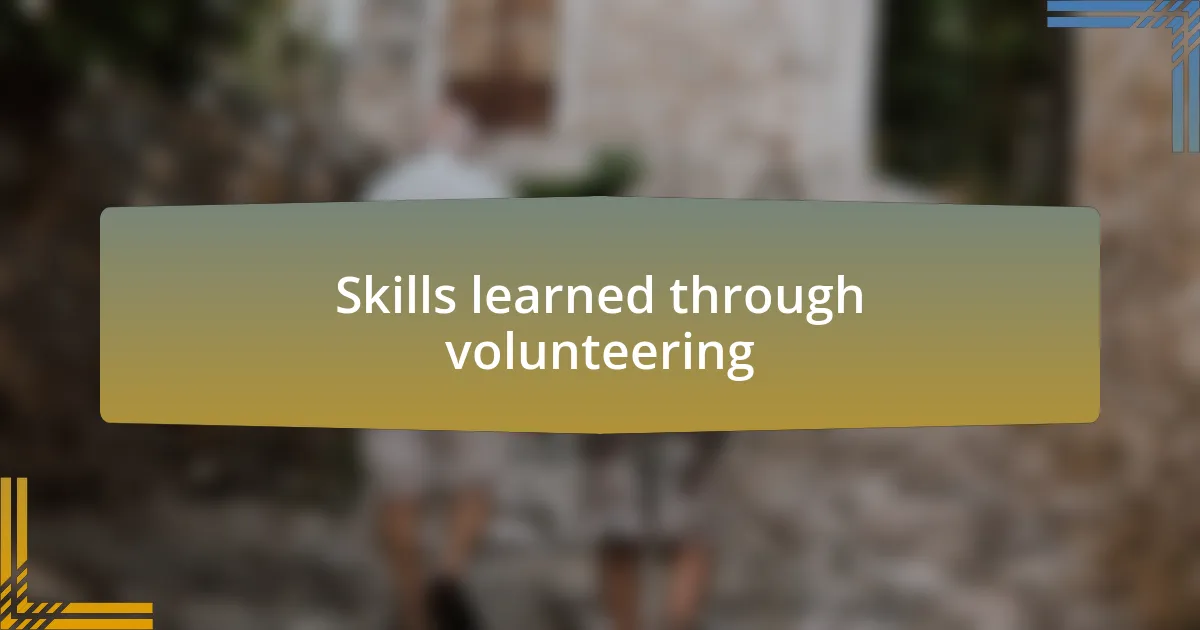
Skills learned through volunteering
Volunteering has taught me the value of adaptability in teamwork. I remember leading a project where we had to pivot halfway through due to unexpected weather. It was remarkable to see how everyone quickly adjusted their roles and strategies, demonstrating resilience and a willingness to embrace change. This experience reinforced for me that flexibility is key in any team dynamic, especially when facing challenges together.
Another essential skill I’ve gained is effective communication. During a food drive, tasks were often juggled—some volunteers sorted donations while others engaged with the public. I found that clear, open communication among us was vital, helping to ensure everything ran smoothly. It reminded me how vital it is to express thoughts and ideas explicitly to avoid misunderstandings, enhancing the overall efficiency of our efforts. Have you ever experienced the difference good communication makes in achieving a shared goal?
Lastly, my volunteering experiences have profoundly highlighted the importance of empathy. In a recent shelter project, I interacted with individuals from various walks of life, and it was eye-opening to hear their stories. This connection helped me understand different perspectives, allowing me to foster a more compassionate approach within the team. Seeing the world through others’ eyes not only builds stronger teams but also enriches our own lives, don’t you think?
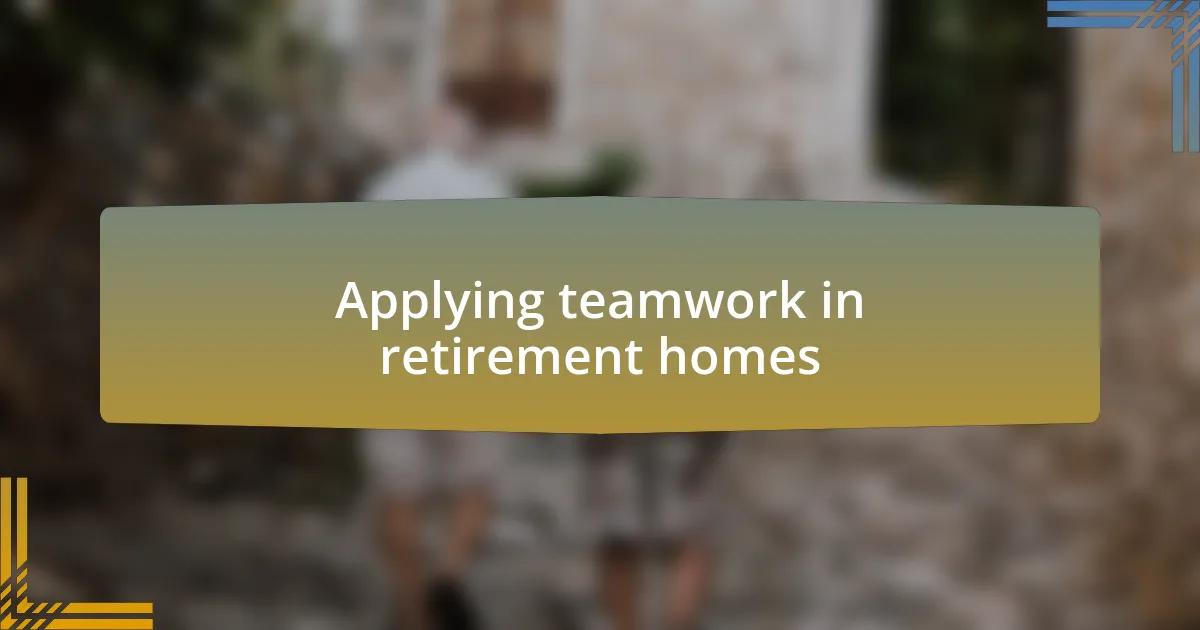
Applying teamwork in retirement homes
Teamwork in retirement homes is crucial for creating a supportive environment where residents thrive. I once participated in organizing a weekly game night, which required collaboration among staff and volunteers. We each brought our unique skills—some of us were great at setting up, while others excelled in engaging residents. This division of responsibilities not only made the event enjoyable but also demonstrated how leveraging individual strengths can lead to a successful collective effort.
One evening stands out in my memory when a volunteer suggested incorporating music into our activities. This simple idea sparked excitement among the residents, and I witnessed the power of brainstorming as everyone contributed their favorite songs. It was a vivid reminder of how open collaboration can enhance our programs and foster a sense of community. Have you ever witnessed the magic that happens when everyone pitches in their ideas for a common purpose?
In retirement homes, teamwork also means creating a sense of belonging. During my time volunteering, we organized outings for residents, which required meticulous planning and coordination. I often felt the pulse of excitement when everyone worked together towards that shared goal, not just to fulfill a task but to bring joy to the lives of those we served. What was apparent to me was that our combined efforts transcended mere teamwork; we were building lasting connections, and that made all the difference.

Building relationships with residents
Building relationships with residents involves investing time in understanding their stories and backgrounds. I remember sitting with one resident who shared her experiences from traveling the world. Engaging in these heartfelt conversations deepened my appreciation for the rich tapestry of lives that each resident represents. Isn’t it fascinating how sharing a story can turn a simple interaction into a meaningful connection?
On another occasion, I organized a gardening club where residents could plant flowers and share tips on nurturing them. Seeing the joy in their faces as they dug into the soil and nurtured their plants was priceless. I learned that sometimes, the smallest activities can cultivate not just gardens but also communities. Have you ever noticed how shared passions can draw people closer together?
As I spent more time in the retirement home, I realized that building relationships is about consistent presence and genuine interest. Late-night chats or simple greetings filled with warmth transformed my role from a volunteer to a trusted companion. This experience taught me that fostering relationships in such settings is not just beneficial; it’s essential for making residents feel valued and understood. Isn’t that what we all seek in our interactions?
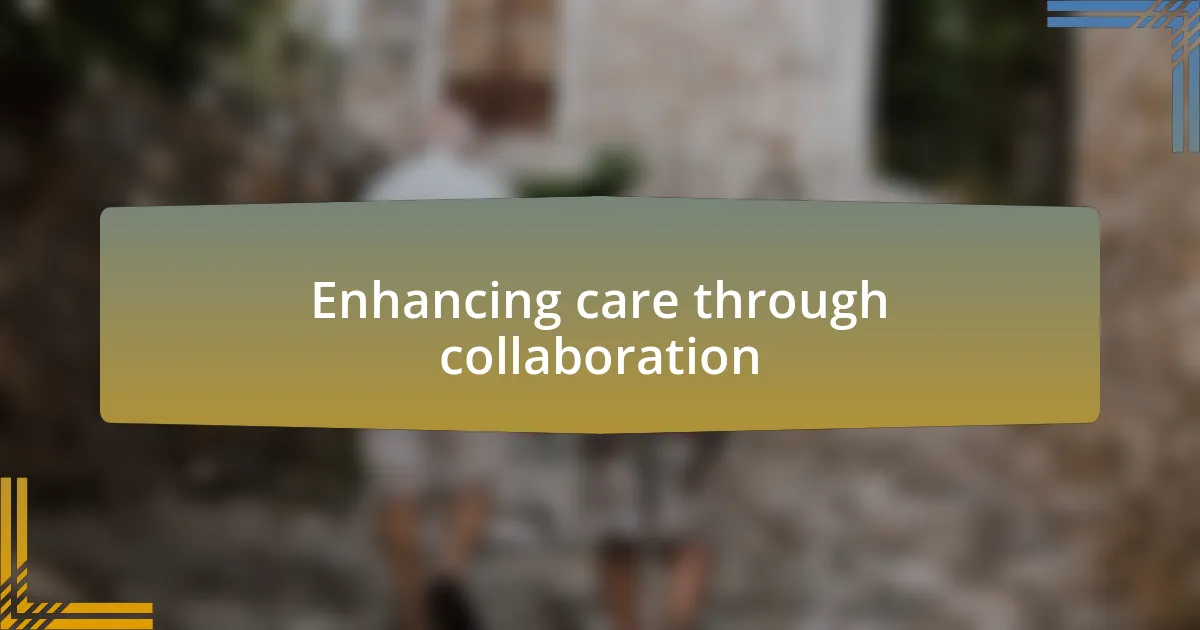
Enhancing care through collaboration
Collaboration in providing care can take many forms, but one of the most impactful experiences I had was during a team project aimed at enhancing the residents’ daily activities. Watching my fellow volunteers and staff come together, sharing ideas and resources, was enlightening. It reminded me that when we pool our strengths, we collectively create a more enriching environment for the residents. How often have you seen teamwork make a difference in a challenging situation?
During a community event, we decided to involve residents in the planning process, allowing them to express their preferences. Their input not only made the event more enjoyable but also sparked a sense of ownership among residents. I’ll never forget the pride on their faces when they saw their ideas brought to life. Collaboration was not just about logistics; it was about empowering residents and fostering a deeper connection within the community.
Another powerful moment happened when we encountered a resident who was feeling isolated. By collaborating with other volunteers, we arranged regular group activities that included her interests. The transformation was remarkable, as she began to engage more with others, and her previously withdrawn demeanor turned into one of joy and participation. Isn’t it incredible how a united front can cultivate individual well-being?
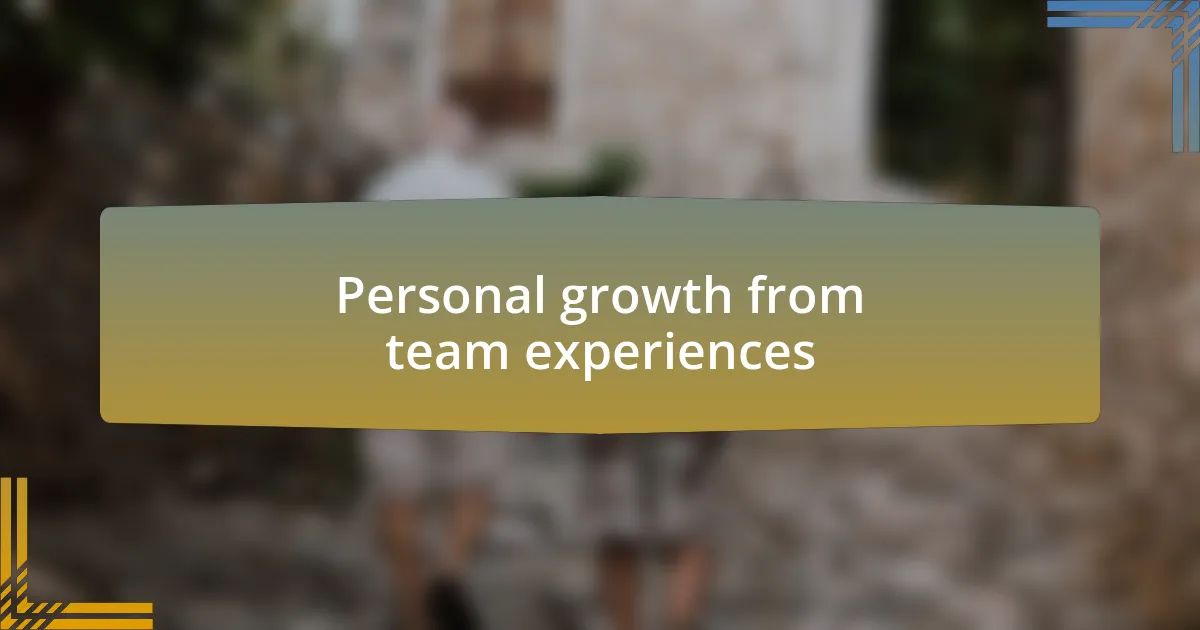
Personal growth from team experiences
Engaging with a team has a unique way of pushing personal boundaries. I recall a time when we faced a tight timeline for an upcoming event, and I found myself needing to step up in ways I never thought possible. As I collaborated with others, I discovered hidden strengths within myself, realizing that teamwork often brings out the best in us. Have you ever surprised yourself by rising to a challenge while working alongside others?
What truly resonated with me was the realization that everyone brings a different perspective to the table. During one particular project, a fellow volunteer suggested a creative approach that I hadn’t considered. At first, I was hesitant, but embracing that idea led to an unexpectedly successful outcome. This taught me that growth often comes from being open to the insights of others. What might you learn if you’re willing to listen to someone else’s viewpoint?
Another profound lesson involved navigating conflict within our group. I remember moments of disagreement that felt uncomfortable, yet addressing them directly fostered deeper understanding and respect among us. Those experiences made me appreciate the value of resilience and communication, essential tools in both teamwork and personal growth. Isn’t it fascinating how facing challenges together can strengthen not only our bonds but also our individual character?